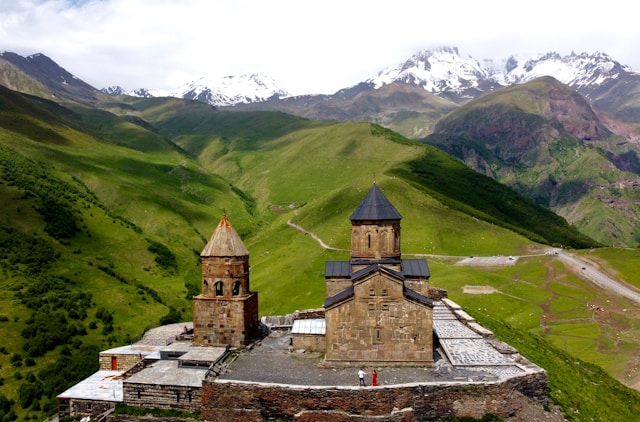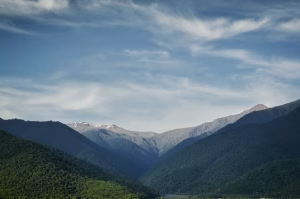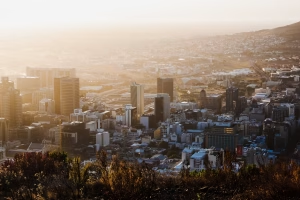Figuring out the best time to visit Georgia requires understanding this Caucasus country’s dramatic seasonal changes and diverse climate zones. This fascinating destination bridges Europe and Asia, offering everything from subtropical beaches to snow-capped mountain peaks.
Georgia’s location creates distinct travel periods that affect activities, costs, and weather conditions across twelve different climate zones. Each season brings unique advantages and challenges for travelers.
This guide examines the weather conditions in Georgia, seasonal attractions, and budget considerations throughout the year. You’ll discover when to find the best deals in Georgia and which months offer optimal conditions for your specific travel interests.
What is the Best Time to Visit Georgia?

Source: https://unsplash.com/photos/houses-under-clouds-XldYOZzDNCM
The best time to visit Georgia spans from late April through October, with May, June and September offering the most reliable weather for outdoor activities in Georgia. This period provides optimal conditions for hiking, sightseeing, and exploring both cities and rural areas.
Spring (April-May) and autumn (September-October) represent ideal windows for balanced weather, moderate crowds, and reasonable prices. Summer months deliver peak conditions for beach season in Georgia along the Black Sea coast.
|
Season |
Best Month to Visit |
Temperature Range (Celsius) |
Chances of Rain |
|
Spring |
April |
19.2°C – 12.1°C |
30% |
|
Spring |
May |
23.5°C – 16.4°C |
25% |
|
Summer |
June |
27.3°C – 21.2°C |
15% |
|
Summer |
July |
29.9°C – 23.8°C |
12% |
|
Summer |
August |
31.0°C – 23.8°C |
10% |
|
Autumn |
September |
26.8°C – 19.7°C |
18% |
|
Autumn |
October |
21.4°C – 15.2°C |
28% |
|
Autumn |
November |
18.1°C – 13.5°C |
35% |
|
Winter |
December |
14.2°C – 9.3°C |
40% |
|
Winter |
January |
4.2°C – -2.4°C |
45% |
|
Winter |
February |
12.8°C – 8.3°C |
38% |
|
Spring |
March |
16.0°C – 9.8°C |
35% |
Source: Weather Atlas Georgia Climate Data and Georgian National Tourism Administration
Suggested Read: Georgia Visa for Indians: A Step-by-Step Guide
Georgia During Different Seasons

Source: https://unsplash.com/photos/aerial-photo-of-building-cFrnCp2DyhE
The climate in Georgia varies dramatically across its twelve distinct climate zones, from humid subtropical conditions along the Black Sea coast to alpine conditions in the Greater Caucasus mountains. This diversity creates unique seasonal experiences for different types of travelers.
Understanding these seasonal patterns helps determine the best months for sightseeing in Georgia, outdoor adventures, and cultural experiences.
Spring (March to May)

Weather: Spring emerges gradually across Georgia, starting cool in March and warming considerably by May. Early spring can still bring occasional snow to mountain regions, while coastal areas begin experiencing pleasant temperatures. Rainfall increases during this season, particularly in April.
Temperature:
- March: 16°C high / 9.8°C low
- April: 19.2°C high / 12.1°C low
- May: 23.5°C high / 16.4°C low
Visitor Numbers: Spring sees moderate tourist numbers, with May becoming increasingly popular as weather improves. Orthodox Easter brings temporary crowds to religious sites.
Events and Festivals:
- New Wine Festival: Held in May at Mtatsminda Park in Tbilisi, this celebration features hundreds of wines from the latest harvest with traditional qvevri opening ceremonies.
- Tbilisi International Book Festival: Running since 1998, this annual event promotes reading culture and features publishers, authors, and literary activities.
- Orthodox Easter: Georgia’s most significant religious celebration includes candlelit processions, midnight services, and traditional feasts featuring roasted lamb and red eggs.
- Gvirila Festival: A charitable celebration in Kutaisi dating back to 1921, featuring theatrical performances, sports competitions, and musical entertainment throughout the city.
Why You Should Visit Now: Spring offers some of the best months for nature lovers in Georgia. Wildflowers bloom across the countryside, hiking trails become accessible, and wine season begins with new harvest celebrations. Hotel rates remain reasonable compared to summer peaks.
Seasonal Dishes & Drinks:
- Pkhali: Spring greens and herbs prepared in traditional Georgian style
- Young wine: Fresh wine from recent harvests available at festivals
- Easter specialties: Traditional lamb dishes and Georgian Orthodox Easter bread
Places to Visit:
- Tbilisi: Perfect weather for exploring the UNESCO World Heritage Site, Old Town and its sulfur baths without summer heat. The capital offers excellent conditions for walking tours and outdoor dining.
- Kakheti Wine Region: Spring marks the beginning of vineyard tours and wine tastings in Georgia’s premier wine-producing area near Telavi.
- Mtskheta: The ancient capital becomes particularly beautiful in spring with blooming landscapes surrounding historical churches and monuments.
What to Pack:
- Layered clothing for temperature fluctuations
- Waterproof jacket for April showers
- Comfortable hiking boots for trail access
- Light sweater for cool evenings
Trip Planning Considerations:
- Outdoor: Excellent for hiking accessible trails, wine region tours, and city walking tours with comfortable temperatures
- Indoor: Museums and cultural sites provide perfect alternatives during occasional spring rain showers
Pro Tips:
- Book accommodations early for Orthodox Easter celebrations
- Check mountain road conditions as some high-altitude passes may still be closed
- Carry rain gear for unpredictable April weather patterns
Ideal for: Wine enthusiasts, cultural travelers, hikers, spring break visitors
Suggested Read: Georgia Visa Photo Requirements for Indians
Summer (June to August)

Source: https://unsplash.com/photos/a-lush-green-field-with-mountains-in-the-background-LEXkhnSUQ9I
Weather: Summer brings the warmest and driest conditions across Georgia. The Black Sea coast experiences subtropical heat tempered by sea breezes, while inland areas like Tbilisi can reach very high temperatures. Mountain regions provide cooler refuges from the heat.
Temperature:
- June: 27.3°C high / 21.2°C low
- July: 29.9°C high / 23.8°C low
- August: 31.0°C high / 23.8°C low
Visitor Numbers: Peak tourist season in Georgia sees maximum crowds, especially along the Black Sea coast. This represents the busiest period for international and domestic tourism.
Events and Festivals:
- WinExpo Georgia: The region’s only international wine and spirits trade fair, held annually at Expo Georgia, featuring over 100 exhibitors from across the Caucasus region.
- Tbilisoba: October’s biggest cultural festival celebrating Tbilisi’s founding with traditional music, dance performances, and regional food displays throughout the city.
- Regional Food Festivals: Summer hosts various Gemo Fest events showcasing local cuisine from different Georgian regions.
Why You Should Visit Now: Beach season in Georgia reaches its peak with ideal swimming conditions along the Black Sea. Water temperatures reach 26-27°C, perfect for all water activities. Mountain hiking trails are fully accessible, offering escape from coastal heat.
Seasonal Dishes & Drinks:
- Fresh Georgian salads: Seasonal vegetables at their peak flavor
- Chilled wines: Local varieties served at optimal temperatures
- Beach-side khachapuri: Georgia’s famous cheese bread enjoyed coastally
Places to Visit:
- Batumi: Georgia’s premier beach destination with warm Black Sea waters reaching 26-27°C, perfect for swimming and water sports.
- Greater Caucasus Mountains:Kazbegi and surrounding areas offer cool mountain air and spectacular hiking opportunities.
- Svaneti Region:Mestia provides relief from summer heat with temperatures around 10-14°C and unique medieval tower architecture.
What to Pack:
- Lightweight, breathable clothing
- Strong sunscreen and wide-brimmed hat
- Swimwear and beach accessories
- Light jacket for mountain visits
Trip Planning Considerations:
- Outdoor: Perfect for beaches, swimming, mountain hiking, and evening city exploration when temperatures cool
- Indoor: Air-conditioned museums and wine cellars provide relief during peak afternoon heat
Pro Tips:
- Book Black Sea accommodations 3-4 months in advance
- Plan mountain day trips to escape coastal heat
- Avoid Tbilisi midday heat by scheduling indoor activities
Ideal for: Beach lovers, mountain hikers, families seeking guaranteed sunshine
Suggested Read: How To Check Georgia Visa Status In India
Autumn (September to November)

Weather: Autumn delivers some of Georgia’s most pleasant conditions, with warm September days gradually cooling through November. September retains summer warmth while October offers perfect sightseeing temperatures. Rainfall increases by November.
Temperature:
- September: 26.8°C high / 19.7°C low
- October: 21.4°C high / 15.2°C low
- November: 18.1°C high / 13.5°C low
Visitor Numbers: September maintains summer crowd levels, but tourists decrease significantly in October and November, creating excellent conditions for peaceful exploration.
Events and Festivals:
- Rtveli Wine Harvest: September through October marks Georgia’s ancient wine harvest tradition with mass picking events, grape pressing, and traditional celebrations throughout Kakheti.
- Tsinandali Music Festival: A prestigious classical music festival held at the historic Chavchavadze Estate, featuring international artists and Georgian performers.
- Tbilisoba City Festival: October’s celebration of Tbilisi’s founding includes street performances, traditional crafts, and regional cuisine displays across the capital.
Why You Should Visit Now: This represents the time for adventure activities in Georgia with ideal hiking temperatures and clear mountain visibility. Wine harvest season creates authentic cultural experiences unavailable at other times.
Seasonal Dishes & Drinks:
- Fresh wine: New harvest wines available directly from producers
- Seasonal produce: Grapes, pomegranates, and persimmons at peak flavor
- Traditional harvest foods: Special dishes prepared during Rtveli celebrations
Places to Visit:
- Kakheti Region: Experience authentic wine harvest activities with local families and traditional winemaking in qvevri vessels.
- Caucasus Mountains: Perfect hiking weather with clear visibility for photography and outdoor adventures in regions like Svaneti and Kazbegi.
- Tbilisi: Comfortable temperatures make city exploration pleasant, with outdoor dining and evening strolls along the Mtkvari River.
What to Pack:
- Light layers for varying daily temperatures
- Waterproof jacket for November rain
- Comfortable walking shoes for hiking
- Camera equipment for optimal lighting conditions
Trip Planning Considerations:
- Outdoor: Best season for hiking, wine region tours, and outdoor photography with excellent lighting
- Indoor: Cultural sites and wine cellars offer perfect alternatives during occasional autumn rain
Pro Tips:
- Plan wine region visits during harvest season for authentic experiences
- Book wine tours in advance as this is peak season for vineyard visits
- Bring warm layers for evening temperature drops
Ideal for: Wine tourists, photographers, hikers, cultural enthusiasts
Suggested Read: Reasons for Georgia Visa Rejection for Indian Nationals
Winter (December to February)

Source: https://unsplash.com/photos/a-large-building-with-a-clock-tower-at-dusk-9jJlkQsqSOg
Weather: Winter brings Georgia’s most varied conditions, from mild coastal temperatures to heavy mountain snow. Tbilisi experiences cold but manageable weather, while ski resorts receive excellent snowfall for winter sports.
Temperature:
- December: 14.2°C high / 9.3°C low
- January: 4.2°C high / -2.4°C low
- February: 12.8°C high / 8.3°C low
Visitor Numbers: Off season travel to Georgia occurs during winter months, with significantly reduced tourism except in ski resort areas. This creates opportunities for authentic local experiences.
Events and Festivals:
- New Year Celebrations: Cities across Georgia celebrate with fireworks, street parties, and traditional Georgian hospitality extending into early January.
- Orthodox Christmas: Celebrated on January 7th with special church services and family gatherings featuring traditional Georgian winter cuisine.
- Lamproba Festival: The “Festival of Lamps” in Mestia features torch processions and unique Svan cultural traditions.
Why You Should Visit Now: Winter offers authentic cultural experiences without tourist crowds. Ski resorts in Gudauri, Bakuriani, and Mestia provide excellent winter sports opportunities with reliable snow conditions.
Seasonal Dishes & Drinks:
- Hearty Georgian stews: Traditional winter dishes like chakapuli and mtsvadi
- Mulled wine: Warm beverages served in mountain regions
- Holiday sweets: Special pastries and desserts for Orthodox celebrations
Places to Visit:
- Gudauri: Premier ski resort with reliable snow conditions and modern facilities for winter sports enthusiasts.
- Tbilisi: Museums, galleries, and traditional bath houses provide warm indoor cultural experiences during cold weather.
- Bakuriani: Family-friendly ski resort offering winter sports lessons and mountain lodge experiences.
What to Pack:
- Heavy winter clothing and thermal layers
- Waterproof snow gear for mountain regions
- Warm boots with good traction
- Ski equipment or rental arrangements
Trip Planning Considerations:
- Outdoor: Limited to ski resorts and short city walks; many mountain roads become impassable
- Indoor: Perfect season for museums, wine cellars, traditional bathhouses, and cultural experiences
Pro Tips:
- Book ski resort accommodations well in advance for peak winter season
- Check mountain road conditions before traveling to remote areas
- Carry backup plans for weather-related travel disruptions
Ideal for: Ski enthusiasts, culture seekers, budget travelers, winter sports families
Suggested Read: Is Georgia Safe to Visit? Everything You Need to Know
Shoulder Season in Georgia

Source: https://unsplash.com/photos/roads-on-hill-under-cloudy-sky-at-daytime-68LGYKIp13g
Late April through May and September through early October represent Georgia’s shoulder seasons, offering excellent compromises between weather, tourist numbers, and costs. These periods deliver some of the best overall travel experiences.
Pros of visiting Georgia during shoulder season:
- Moderate accommodation rates compared to peak summer pricing
- Pleasant temperatures suitable for diverse outdoor activities
- Reduced crowds at popular attractions and restaurants
- Full accessibility to most tourist services and transportation
- Excellent conditions for both cultural and adventure tourism
Cons of visiting Georgia during shoulder season:
- Occasional weather variability, especially in early spring and late autumn
- Some mountain roads may have limited access in early spring
- Potential for rain showers requiring flexible planning
- Limited beach swimming in early spring months
Suggested Read: Nightlife in Georgia: Top 11 Spots to Explore
Cheapest Time to Visit Georgia

Source: https://unsplash.com/photos/houses-on-hills-spIYDNnINbg
Budget friendly months to visit Georgia occur primarily from November through March, with January and February offering the most significant savings. During these months, accommodation costs drop 40-60% compared to summer rates.
Budget Tips:
- Book flights 45-60 days in advance for optimal pricing
- Consider guest house accommodations for authentic experiences and lower costs
- Focus travel on accessible regions during winter months
- Take advantage of reduced entrance fees at museums and cultural sites
- Eat at family-run restaurants away from tourist areas
Monthly Budget Breakdown:
- November-February: Maximum savings but limited mountain access
- March-April: Moderate savings with improving weather
- May-June: Rising prices but full service availability
- July-August: Peak pricing across all sectors
Suggested Read: Georgia’s Remarkable Monuments: 12 Ancient & Modern Landmarks Worth Your Time
Challenging Seasons for Georgia Travel

Source: https://unsplash.com/photos/village-during-daytime-ZTTjG9CS0c0
While Georgia offers year-round appeal, certain periods present specific challenges that travelers should consider when planning visits.
Peak Summer Heat (July-August)
These months can be extremely challenging due to intense heat, particularly in Tbilisi where temperatures often exceed 35°C (95°F). When to visit Georgia for fewer crowds becomes crucial as popular destinations become overwhelmed, especially along the Black Sea coast.
Summer also brings holiday season travel to Georgia with domestic tourists adding to international visitor numbers, creating crowded conditions and inflated prices.
Winter Mountain Access (December-March)
Many mountain regions become difficult or impossible to reach due to snow-blocked roads and closed passes. The road to Svaneti, popular hiking trails, and remote monasteries often become inaccessible during winter months.
While Tbilisi and Batumi remain accessible, many rural guesthouses and mountain accommodations close for the season.
Why You Might Avoid These Periods:
- Extreme temperatures making outdoor activities uncomfortable
- Overwhelming crowds during peak summer months
- Limited access to mountain regions during winter
- Significantly higher prices during summer peak season
Who Should Avoid These Times: Budget-conscious travelers, heat-sensitive visitors, mountain hikers, those seeking peaceful experiences.


FAQs
Which month offers the best overall conditions for visiting Georgia?
May stands out as the optimal single month for most travelers. Temperatures average 20-24°C with minimal rainfall, perfect hiking weather, and the beginning of wine season. The month offers comfortable conditions for both cultural sightseeing and outdoor activities.
How many days should you plan for a Georgia vacation?
Eight to ten days provides adequate time to experience Georgia’s highlights, including Tbilisi, the wine region of Kakheti, and either mountain or coastal areas. First-time visitors typically spend 3-4 days in Tbilisi and the remainder exploring regional attractions.
What months experience the most challenging weather conditions in Georgia?
January and February bring the coldest temperatures with frequent snowfall in mountain regions, while July and August can be oppressively hot with temperatures exceeding 35°C in Tbilisi. These months limit outdoor activity options during certain times of day.
When does off season travel to Georgia occur?
Off season travel to Georgia spans November through March, with December through February representing the lowest tourist numbers. This period offers significant cost savings but comes with weather limitations and reduced service availability in mountain regions.
When can you find the best deals in Georgia?
January through March provides the most substantial savings on accommodation and flights, with discounts reaching 50-60% below peak season rates. November and early December also offer excellent value while maintaining better weather conditions and service availability.
What seasonal considerations affect packing for Georgia?
Packing varies dramatically by season and region. Summer requires lightweight clothing and sun protection, while winter demands heavy thermal gear for mountain areas. Spring and autumn call for versatile layering options and rain protection due to unpredictable weather patterns.
What is the best time to visit Georgia for photographers?
April through June and September through October provide optimal conditions with excellent lighting, moderate crowds, and diverse subject matter. The best time to visit Georgia for photographers combines favorable weather conditions in Georgia with seasonal attractions.





















